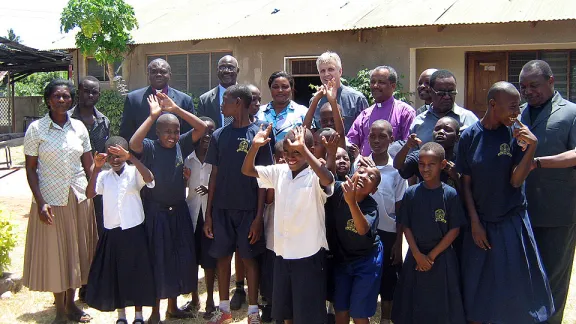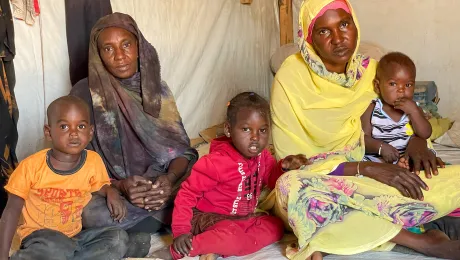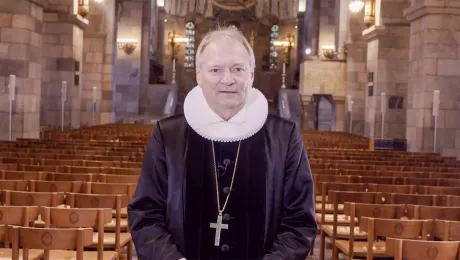
The Lutheran leaders with children residing at the ELCT center in Temeke district, Tanzania. © ELCT
LWF General Secretary Junge Visits Destroyed Church Building in ELCT Diocese
The Lutheran World Federation (LWF) leaders visiting the Evangelical Lutheran Church in Tanzania (ELCT) Eastern and Coastal diocese have affirmed the crucial role of congregations in offering space for interfaith encounter, healing and reconciliation to mitigate conflict in society.
“Violence in various contexts leaves indelible marks as a reminder of the suffering endured individually and collectively. While it is important to commemorate such painful events, we should not be paralyzed by the violence suffered, but should instead find ways to invigorate actions for transformative witness,” said LWF General Secretary Rev. Martin Junge, who led the delegation, 13-15 February.
The three person-team included Rev. Dr Wakseyoum Idosa, President of the Ethiopian Evangelical Church Mekane Yesus (EECMY) and head of the Lutheran Communion in Central and Eastern Africa (LUCCEA), and Rev. Dr Panti Filibus Musa, director of the LWF Department for Mission and Development. They were hosted by the ELCT Presiding Bishop Dr Alex G. Malasusa, who is LWF Vice President for Africa.
The ELCT Mbagala parish is among churches and Christian buildings that were burned by people suspected to be Islamic extremists in the country’s coastal region in October 2012. The altar and parish offices were extensively damaged.
During discussions with the parish members, Junge expressed sadness for the damage and support for the church community’s persistence to remain calm. He reiterated the message by ELCT bishops last October, and urged restraint from any move of retaliation but instead “set an example in showing God’s great love for humankind.”
Idosa reminded the ELCT leaders and the Mbagala parish members that “the most important thing Christians should do in such situations is to comply with the commandment to love one another,” and continue to be law-abiding citizens. Preserving peace and tolerance should be prioritized and taught to children and to the public at large, he emphasized.
Malasusa thanked the LWF delegation “for taking the time to visit and comfort” the ELCT diocese and to see for themselves the extent of destruction. “Your action has demonstrated your love for the church, and that you are friends indeed who love those in need,” said the ELCT leader.
“It was very moving for me to hear from the parish members that when they restore the church building, they want to preserve some of the damaged sections as a reminder of what happened here, so that ‘it strengthens us in our resolve to say never again’,” Junge said, reflecting on the visit to the destroyed church.
The LWF general secretary expressed his deep recognition for the pastoral work done in the Mbagala parish after such painful events. “Their plan to address with strong resolve issues of poverty and lack of opportunities among the youth, and to make their congregation a place of interfaith encounter and cooperation has impressed me deeply. It tells about the vitality of the Gospel of Jesus Christ in the midst of this congregation,” he added.
The LWF delegation also visited some of the institutions run by the diocese’s social services department including a health center, a girls’ secondary school and a home for children with disabilities.
The ELCT has 20 dioceses, bringing together more than 5.8 million members. It joined the LWF in 1964.
(The ELCT communications office contributed to this article.)


